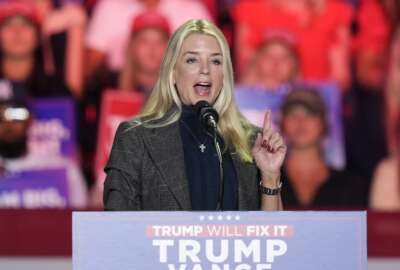Hoyer: Governing ‘like a true national majority party’
A look ahead to the next Congress, with the House Majority Leader.
By Max Cacas
FederalNewsRadio
For the first time in over 40 years, Democrats will control both the White House and Congress. For the House’s Number Two Democratic leader, the outcome of the recent elections present both a challenge and an opportunity in the 111th Congress.
In his speech yesterday to the National Press Club, House Majority Leader Steny Hoyer, a Democrat from Maryland, took a moment to first talk about House Republicans, and the temptation, as he described it, to “emphasize disagreement and practice obstruction.”
Especially when so many are blaming the media, blaming moderates, blaming everyone but themselves for what happened on November 4th.
But we know what happened: over the last eight years, Republicans had an unprecedented opportunity to put their philosophy into effect, and it was weighed, and measured, and found sorely wanting. Some conservatives understand that already. As the National Review‘s Ramesh Ponnuru put it, “What we have seen over the last two election cycles, it should be emphasized, was not the rejection of one or another faction of the Republican party, but of the party itself.”
Hoyer says he recognizes the inherent danger of a single party dominating the discussion at a time when the country has so many problems.
Our country needs a loyal opposition to work constructively on legislation, to challenge Democratic arguments and hold us to account. Our country needs Republican leaders in the tradition of Bob Michel, Everett Dirksen, and Howard Baker: conservatives who are strong in their principles, but who would rather help shape legislation for the common good than reflexively obstruct it for partisan positioning.
The Majority Leader, the number two Democrat in the House behind Speaker Nancy Pelosi, acknowledged that in their victory, Democrats have a sobering lesson to ponder.
At the same time, we should remember that minorities don’t win elections. Majorities lose them. Majorities lose elections when they pursue partisanship to the exclusion of common-sense compromise and accomplishment.
So we must remember where our majority came from. We did not just make full-blown ideological converts of the other half of the country. What we did do, and this in itself was a huge accomplishment, was convince majority-making independents that we will govern responsibly at a time of national crisis.
The 33 to 36 new Members of Congress coming to Washington to swell our side of the aisle are pragmatic, not dogmatic. They were elected on promises of bipartisanship and fiscal discipline. They were elected, quite simply, to solve problems, not further politicize Washington.
Democrats won in every region of the Country, and our nominee for President won more than 50% of the vote. For the first time in decades, we are true national majority party, and if we want to stay that way, we must govern like one.
Hoyer spoke in advance of meetings of the House Democratic Caucus, and because of that, did not discuss the battle for the leadership of the House Oversight and Commerce Committees. He did say that the nation’s fiscal health rises to the top of the list for President-elect Obama and the Congress the day after the Inauguration.
They will include funding to create jobs by rebuilding our worn-down infrastructure: the roads, bridges, pipes, and tracks that serve our communities and our commerce. In addition, we must ensure that all of our people have access to broadband connections.
Economic recovery will also mean helping hard-pressed states with federal Medicaid assistance, so that workers who have lost their jobs and their health insurance will still have access to healthcare. Conditions also warrant temporarily increasing food stamp benefits and extending unemployment insurance. Those measures do not just help those who are hurting most-economists consider them some of the most efficient kinds of stimulus.
We will continue to be committed to the principle of pay-as-you-go. The reality, however, is that recovery legislation will raise the deficit in the short term. Fiscal hawk that I am, I still believe that that is the right course, because a wide consensus of economists tells us that deficit spending is both the way out of a recession like this one and the way to prevent even more catastrophic decline.
Hoyer also talked about the need for health care reform, addressing global warming, energy independence and the need to rebuild the armed forces depleted by years of war.
The Maryland Democrat, whose district includes the homes of many Federal workers, said he hopes to work with President-elect Obama on legislation, if needed, to adopt a 10-hour-a-day, four-day workweek for feds, which he says would save energy, and relieve traffic congestion on the roads in places like Washington, D.C. Earlier this year, Utah became one of the first states to adopt a four-day, 40-hour workweek for many state workers.
Mr. Hoyer also said he hopes to revive a bill to raise the percentage that the government chips in for the health care of feds from the current 73 percent, up to 80 percent.
——
On the Web:
Office of the Majority Leader – http://www.majorityleader.house.gov/
(Copyright 2008 by FederalNewsRadio.com. All Rights Reserved.)
Copyright © 2024 Federal News Network. All rights reserved. This website is not intended for users located within the European Economic Area.





